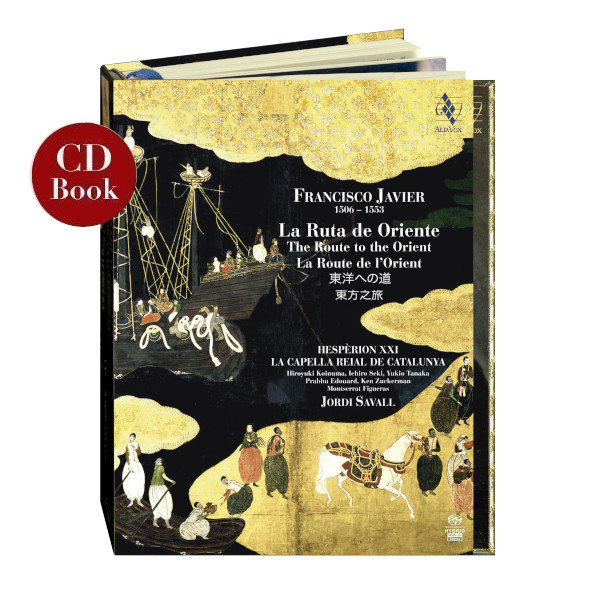FRANCISCO JAVIER
La Ruta de Oriente
Hespèrion XXI, Jordi Savall, La Capella Reial de Catalunya, Montserrat Figueras
32,99€
Reference: AVSA9856
- Hespèrion XXI
- La Capella Reial de Catalunya
- Jordi Savall
Although we had been intrigued for many years by the extraordinary travels of Francis Xavier, the seminal idea for this programme began to take shape in the spring of 1996, when we were invited by the Festival of St. Florent le Vieil to give a concert with Spanish and Japanese musicians to commemorate Francis Xavier’s arrival in Japan. The programme was entitled “1549 RITUALS & PROPHECIES: Japan & Spain in the time of Saint Francis Xavier.”
The World is a book,
and those who do not travel
read only a page.”
St. Augustine of Hippo (5th century)
Although we had been intrigued for many years by the extraordinary travels of Francis Xavier, the seminal idea for this programme began to take shape in the spring of 1996, when we were invited by the Festival of St. Florent le Vieil to give a concert with Spanish and Japanese musicians to commemorate Francis Xavier’s arrival in Japan. The programme was entitled “1549 RITUALS & PROPHECIES: Japan & Spain in the time of Saint Francis Xavier.” The concert was performed on 10th July, 1996, in the Abbey of St. Florent, with the participation of Montserrat Figueras, soloists of La Capella Reial de Catalunya and members of HESPÈRION XX, and the Japanese musicians Yumiko Kaneko, Ichiro Seki and Masako Hirao. A few months later, the same programme was performed in Tochigi, Kyoto, Yamaguchi and Tokyo. Ten years later, in 2006, most of that original group of Spanish and Japanese musicians came together again to mark the 400th anniversary of the birth of Francis Xavier, and we took the opportunity to give a number of concerts and prepare the recording of this fascinating new CD/book.
The commemoration of Francis Xavier’s arrival in Japan and his subsequent death was the initial reason behind the project, but the basic idea which inspired the development and content of this programme grew out of our wonder and admiration at his incredible epic journey and, above all, the spiritual and human dimension of Francis Xavier. This is the astonishing story of a man who lived both his life and his beliefs intensely and rigorously practised all the fundamental rules of the newly-formed Society of Jesus: rules of poverty, charity, abnegation and sacrifice for the sake of the most humble and the outcasts of society. A true apostle of his faith who, in less than twelve years, and despite the limited means available in his age, travelled almost 100,000 kilometres: Driven by the force of his beliefs, and bravely confronting the most dangerous of circumstances, he defied the power and pride of the bonzes to lay the foundations of new Christian communities.
+ information in the CD booklet
JORDI SAVALL
Geneva, autumn 2007







Share